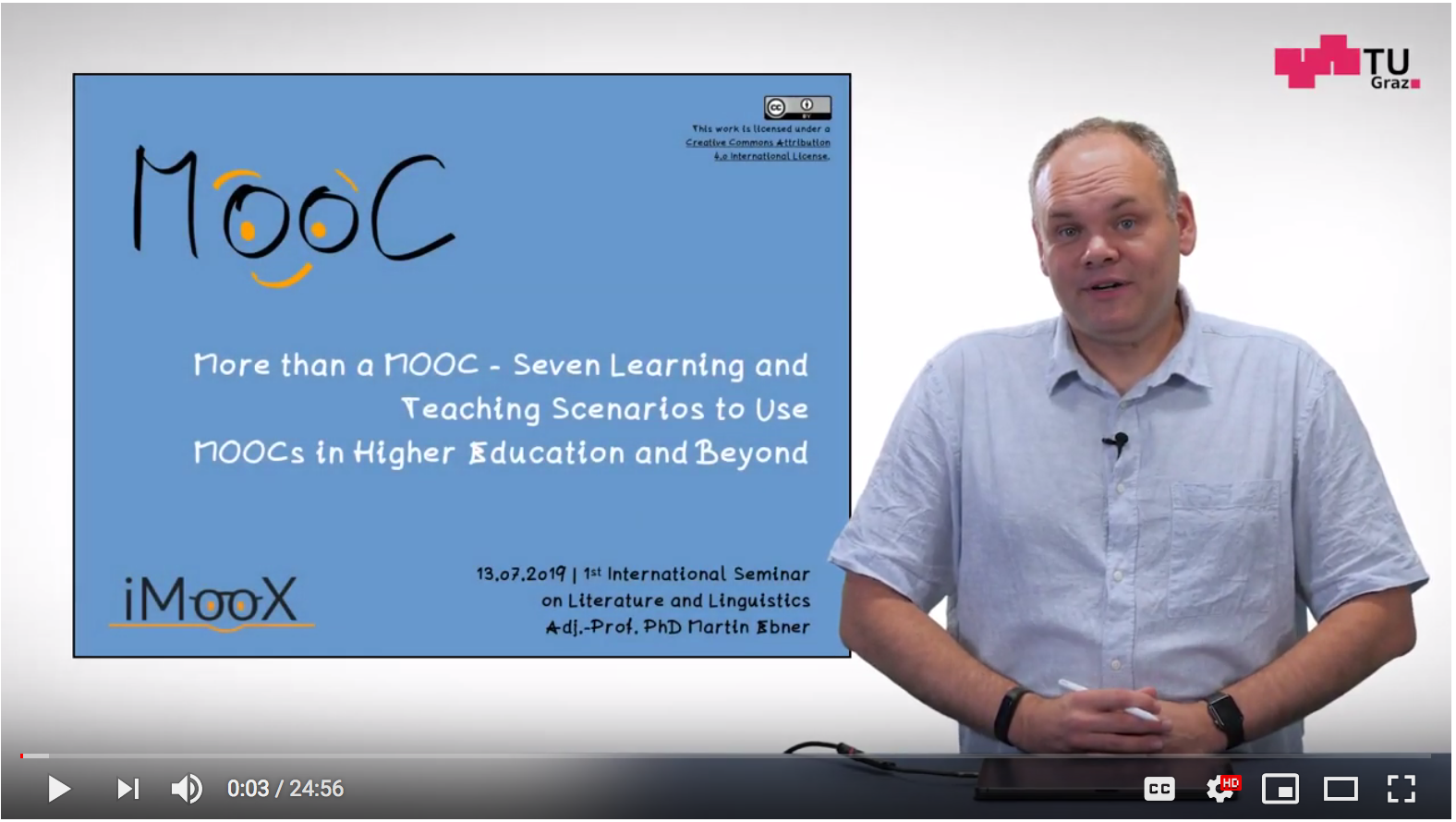Keynote Review: More than a MOOC- Seven Learning and Teaching Scenarios to Use MOOCs in Higher Education and Beyond

Dr. Martin Ebner, an Austrian researcher who is an expert on open educational resources (OER) and massive open online courses (MOOCs) recently presented a keynote to the “International Seminar on Linguistics and Literature” at the ‘Universitas Muhammadiyah Purwokerto’, in Central Java, Indonesia. Allie Alayan provides an overview of the central takeaways from the keynote “More than a MOOC- Seven Learning and Teaching Scenarios to Use MOOCs in Higher Education and Beyond”.
MOOCs and iMooX
Dr. Ebner has been conducting research on topics surrounding open education for more than 15 years, and is one of the initiators of iMooX, the only MOOC platform for the German-speaking areas. He begins the keynote with the question ‘what is a MOOC’:
M= massive = for many
O= open = continuum from free access to open educational resources (OER)
O= online
C= course = structured
He then introduces the MOOC platform iMooX and describes the main components of MOOCs, including units, videos, and digital badges. Founded in December 2013 by the University of Graz and the Graz University of Technology, iMooX is the first and only Austrian MOOC platform. iMooX is a publicly funded project designed to bring open online education to a public audience, in particular k12 students and adult learners. Courses offered through iMoox are licensed as creative commons, thus furthering the Open Educational Resources (OER) movement. Content offered on iMooX can be used by anyone for their own (teaching) purposes and can be reused free of charge.
MOOC Research
Dr. Ebner provides a summary of past research conducted on the effectiveness of MOOCs and concludes that MOOCs provide a unique educational opportunity for broad audiences. He addresses the criticism that not many people complete MOOCs. He provides statistics and displays graphs to reveal that dropout rates and completion rates for MOOC courses are comparable to rates for normal lectures. Learning happens- always, at any time- but perhaps not as structured as we expect. MOOCs provide unique learning opportunities for students. Dr. Ebner presents statistics on student activity levels as the course progresses, as well as data on times of the day that students are accessing MOOCs. Dr. Ebner also provides information on how to motivate learners in MOOCs.
(Re-)Using MOOCs: 7 Scenarios
The keynote provides insight into the many opportunities where MOOCs can be used as a course in-and-of itself or as an addition to face-to-face sessions or other course settings. If the content is also available as open educational resources, the exchange in between other institutions and usage by external organizations is simplified.
Type 1: the conventional MOOC (a pure online course for many users)
Type 2: the Pre-MOOC (an online course as preparation for a following learning event)
Type 3: the Blended MOOC (a MOOC that is integrated in between several face-to-face learning events)
Type 4: the In-Between MOOC (is a special form of type 3, where the MOOC is in-between two face-to-face events)
Type 5: the Inverse-Blended MOOC (a type of MOOC which is enriched by face-to-face meetings and events)
Type 6: Flipped MOOC (a MOOC is used to flipped/inverted classroom concept: the MOOC prepares parallel for the face-to-face phases which are focused to discuss, train or apply knowledge)
Type 7: Lecture MOOC (is accompanied by online activities in the Learning Management System of an educational organization, which allows e.g. additional non-public discussions and tests)
Dr. Ebner concludes by reiterating that MOOCs are not a trend or hype, they are the consistent and logical further development of online teaching and learning and they help to made educational content accessible.
The entire keynote is available on youtube: https://youtu.be/s8lhsBmCDoI
About:
Martin Ebner is head of the Department Educational Technology at Graz University of Technology. In this role, he is responsible for all university wide e-learning activities. He holds an Adjunct Prof. on media informatics (research area: educational technology) and works also at the Institute for Interactive Systems and Data Science as senior researcher. His research focuses strongly on seamless learning, learning analytics, open educational resources, making and computer science for children. Martin has given a number of lectures in this area as well as workshops and keynotes at international conferences. For publications as well as further research activities, please visit his website: http://martinebner.at. If you would like to contact Martin Ebner, you can email him at [email protected] or you can communicate with him on twitter (his twitter handle is @mebner).
